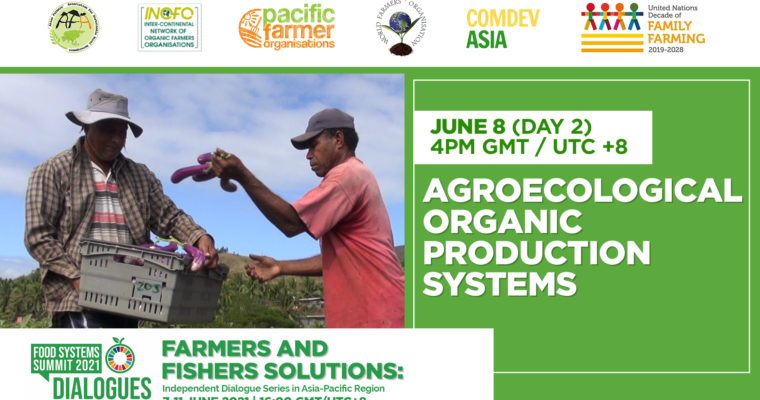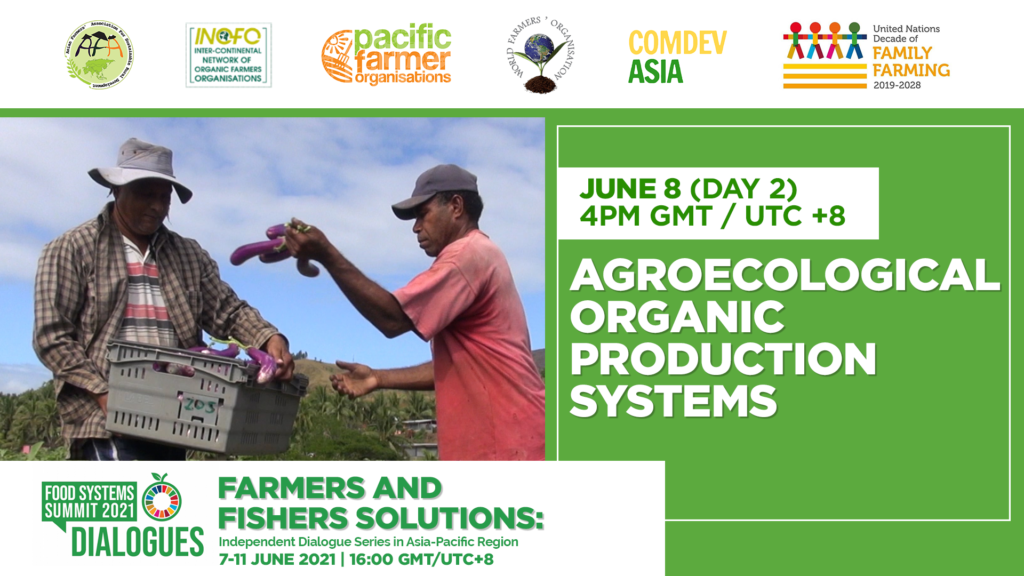Sustainable Food Systems driven by Agroecology and Organic Production Systems
Lead organizer: Intercontinental Network of Organic Farmers Organizations (INOFO)
June 8, 2021, 4:00 PM – 6:30 PM Philippine Standard Time
REGISTER HERE
Understanding the Food Systems Summit
The UN Secretary-General, António Guterres, has called on all world leaders to take part in the Food Systems Summit in 2021 to help establish the future direction for food systems in the world and accelerate collective action to that end. This reflects the recognition that transforming food systems is central in efforts to achieve all the 17 Sustainable Development Goals (SDGs) by 2030. The Summit will be held in New York in September 2021, and will be preceded by a Pre-Summit in Rome in July 2021.
The Food Systems Summit will launch new actions to deliver progress on all 17 SDGs, each of which relies to some degree on healthier, more sustainable, and equitable food systems.
The Summit expects the following outcomes:
- Dramatically elevated public discourse about the importance of food systems leading to the achievement of the SDGs.
- Significant action, with measurable outcomes. (This will include highlighting existing solutions and celebrating leaders in food systems transformation, as well as calling for new actions worldwide)
- A high-level set of principles established through the process that will guide Member States and other stakeholders to leverage their food systems capacity to support the SDGs.
- A system of follow-up and review that will drive new actions and results; allow for sharing of experiences, lessons and knowledge; and incorporate new metrics for impact analysis.
However, debates are surfacing as to what direction the food systems summit will take to ensure that issues on hunger, malnutrition, social justice, and the planet will be at the fore of these solutions. A revisit and evaluation of our present food system is also imperative if we are to chart a transformative, just, resilient, and sustainable food system that puts the interests and needs of food producers and consumers across the globe. As such, they said summit matters to everyone, from the food producers to the consumers, and has never been timelier given the challenges of the Covid-19 pandemic.
Food Systems Summit Dialogues
In preparation for the Summit, the UN Special Envoy for the Food Systems Summit Dr. Agnes Kalibata has invited all sectors of society to share their perspectives and solutions. These Dialogues obtain input from a global audience (from youth activists to indigenous leaders, from smallholder farmers to scientists and CEOs) both before and after the Summit with the aim to transform the way the world produces, consumes, and disposes of food.
Independent Summit Dialogues, such as this event facilitated by Farmers Forum, will only connect to the Summit process through an official feedback mechanism. Independent Summit Dialogues will offer opportunities and spaces for citizens to critically engage and propose pathways towards sustainable food systems, exploring new ways of working together and encouraging collaborative action.
The outcomes of the Dialogues will feed into the Summit’s five priority Action Tracks and the preparatory work of its Scientific Group to support changes in global food systems to deliver the SDGs by 2030.
Independent Dialogues on Agroecology and Organic Production Systems
The promotion of Agroecology follows the formal recommendations made by the Committee of World Food Security (CFS) and its High Level Panel of Expert (HLPE) report to foster Agroecology as an actionable and sustainable approach for contributing to a Food System transformation that enhances food security and nutrition. Through this solution, we aim to address the inherent complexity of food systems, whose transformation requires a comprehensive and systemic approach.
The concept of Agroecology does not present a narrow defined silver bullet solution but should be understood as a framework, building on core ecological principles that can be translated into a range of practices and systemic changes to be applied in a context-specific manner. FAO identifies 10 Elements of Agroecology that guide policy makers, practitioners and stakeholders in operationalizing agroecological transitions.
Agroecology is a scientific discipline and a recognized social movement that nowadays is underpinned by a considerable evidence base for various production contexts. The HLPE report on Agroecological and other innovative approaches, and the FAO Agroecology Hub are considered common denominators for the definition and framework of Agroecology. The proposed approach mimics natural ecological systems’ principles for resilient and healthy food production while addressing systemic challenges such as, depletion of soils and natural resources, biodiversity loss, pollution and climate change. Finally, agroecology as a solution aims at boosting family farmers, food producers and consumer agencies rather than treating them merely as beneficiaries.
Building on the ecological cornerstones of healthy and fertile soils, diversity, redundancy and closing ecological cycles to increase nutrient and resource use efficiency as well as fostering natural regulation processes, Agroecology is mimicking natural ecosystems.
Alternately, civil society groups define agroecology as a holistic approach to sustainable agriculture and food systems. Beyond its biophysical and ecological aspects, we look at agroecology as being strongly grounded on the environmental; social and cultural; economic; and political dimensions of sustainability, as defined and outlined by the Pesticide Action Network (PAN) International and Coopération Internationale pour le Développement et la Solidarité (CIDSE)
On the other hand, “organic agriculture is a holistic production management system which promotes and enhances agro-ecosystem health, including biodiversity, biological cycles, and soil biological activity. It emphasises the use of management practices in preference to the use of off-farm inputs, taking into account that regional conditions require locally adapted systems. This is accomplished by using, where possible, agronomic, biological, and mechanical methods, as opposed to using synthetic materials, to fulfil any specific function within the system.” (FAO/WHO Codex Alimentarius Commission, 1999).
Organic production systems are inclusive of all the Agroecology principles with an additional element of ban on chemical fertilisers and pesticides. Because it’s believed in organic farming and backed by numerous scientific studies that all living creatures in the ecological food web of life – the microbes, insects including butterflies, amphibians, birds and the entire biodiversity gets adversely affected by the use of chemical fertilisers and the pesticides which then affects the pollination, soil carbon and closing of these ecological cycles ultimately leading to unsustainable, toxic food systems that affect our health and environments.
Farmers do understand this but because they are unaware or have no access to these alternative resources for pest control, they succumb to what is available and easily accessible to control the pests. With the increased use of chemical pesticides, the farmers are now becoming aware of the resistance to chemicals by the existing pests and how this is a never ending vicious trap. Hence, many farmers are resorting to more sustainable alternatives of employing low cost, locally sourced, farm made organic pest repellents, advocated under the Organic Production Systems.
Agroecology and Organic Farming is practiced widely all over the world, often by small-scale operations. Even though IFAD and FAO and the other UN agencies recognise the importance of farmers, indigenous people, youth and women in Agroecology and the Organic Production Systems, when it comes to the ground realities of a farmer in his/ her locality, it’s still a huge struggle to convince the neighbouring farmers, consumers, municipalities and ultimately Governments about the importance Agroecology and the innovative approaches to conversion to more regenerative practices.
Objectives
- Inform and educate the participants about the issues and challenges of the present food system and the role of agroecology and organic production systems in addressing these issues
- Make use of the Independent Dialogue to put the voices of the small farmers and the marginalized in setting the agenda and proposing pro-farmer, pro-people and pro-planet solutions to the Food Systems Summit
Participants
Target participants are farmers doing agro ecological and organic systems or are
transitioning towards these practices, NGOs, academe, local and national government agencies officials, international partners and other support groups.
Program
| Time | Topic | Speaker/Person-in-Charge |
| 3:50 – 4:00 PM | Admission of Participants in Zoom Conference | Zoom expert |
| 4:00 – 4:10 PM | Discussion of rationale and the issues concerning agroecology and organic food production systems | Shamika Mone, INOFO President |
| 4:10 – 4:25 | Agroecoloy and organic agriculture: a path to just, equitable, healthy and sustainable solution to food systems crisis | Dr. Charito Medina, Philippines |
| 4:25 – 5:10 | Presentation of Proposed Solutions (10 minutes each speaker) –
Solutions are in the context of ecological, organic food production systems – from seeds to marketing.
– Hindi – India – Sri Lanka – Tamil – Indonesia – Bahasa – Vietnam – Vietnamese
|
l India (OFAI) – Seed, knowledge and traditional utilization and conservation – Mr. Sanjay Patil
l Sri Lanka (LOAM) – Traditional Food Systems -Thilak l Laos Farmer Network – Agroecology in Agroforestry l Indonesia (Indonesia Organic Alliance) – Research – Farmers’ autonomy in PGS – Mrs. Vanda Ningrum l and Vietnam (PGS Vietnam) – Organic supply and value chain (15 minute presentation) – Tu Tuyet Nhung |
| 5:10 – 5:50
|
Breakout sessions: Sub-regional and country experience sharing and discussions on recommendations (45 mins)
Guide questions: l Aside from what has been presented, what are the solutions would you recommend to the UNFSS? l Please enumerate ways for scaling out the solutions presented (ex. Make agroecology the new normal; provide funding for transitioning farmers, etc.) |
|
| 5:50 – 6:00 | Response and closing remarks | Abram J. Bicksler, Ph.D., FAO
Agricultural Officer – Agroecology and Ecosystem Services Team (NSPED) |





Comments are closed